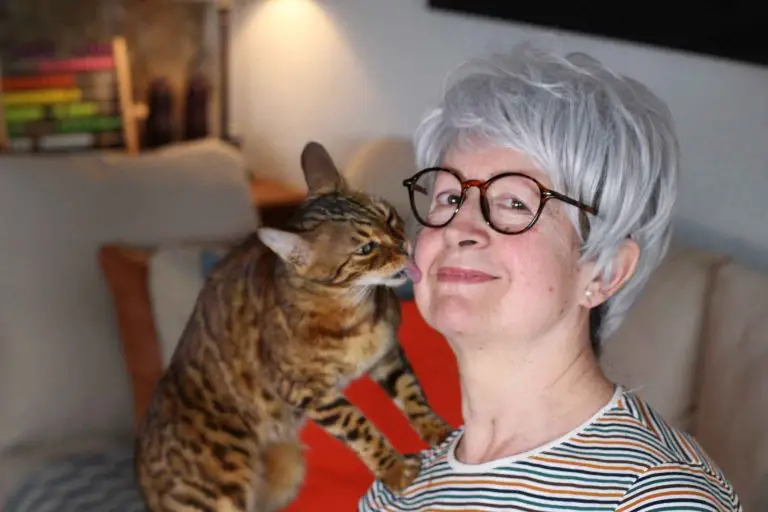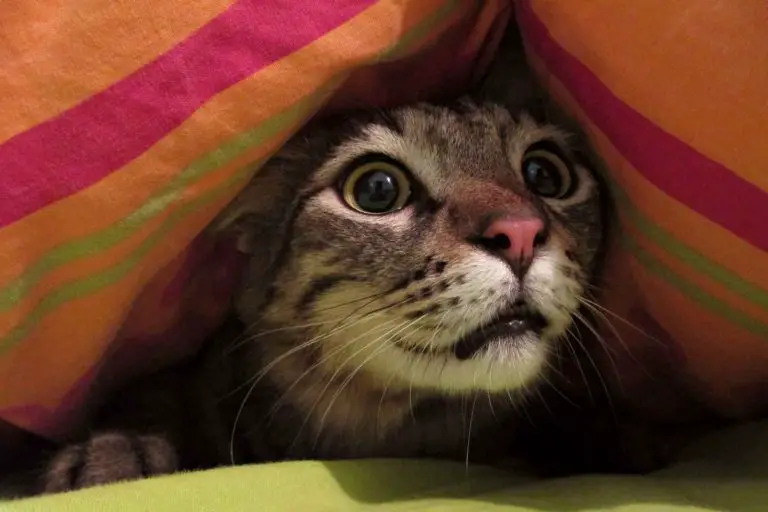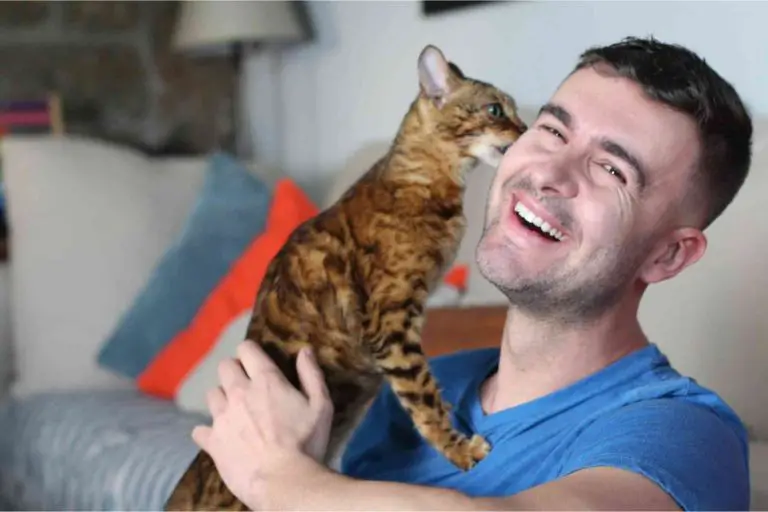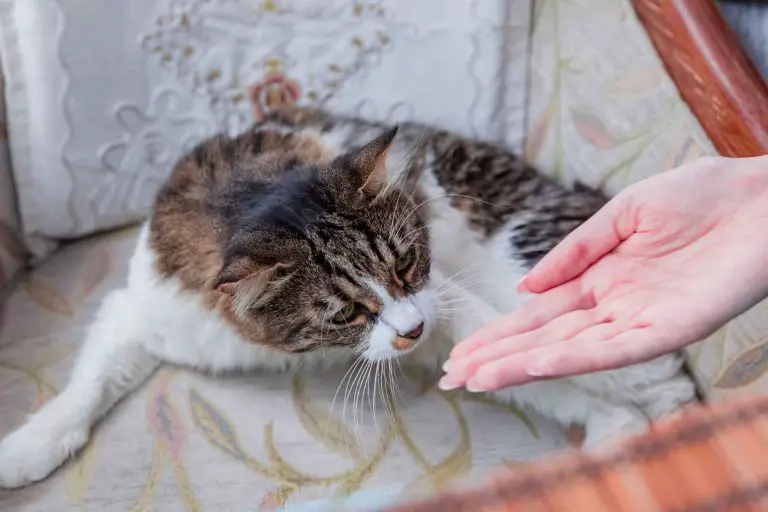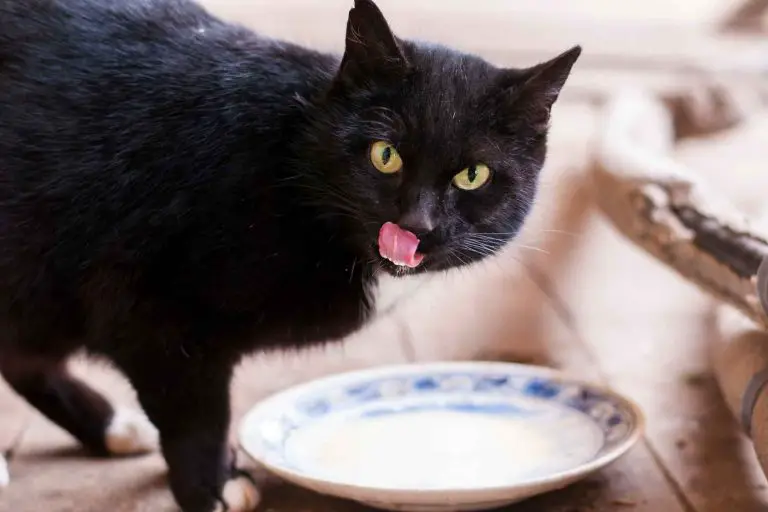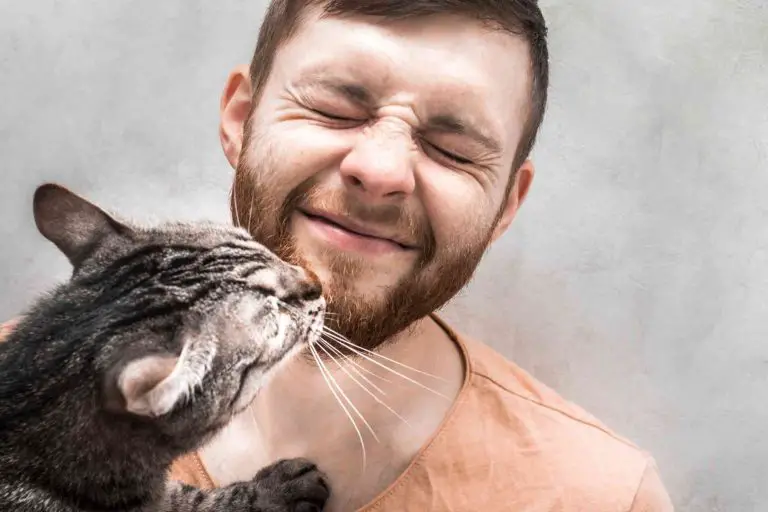Can Cats Eat Dog Food?
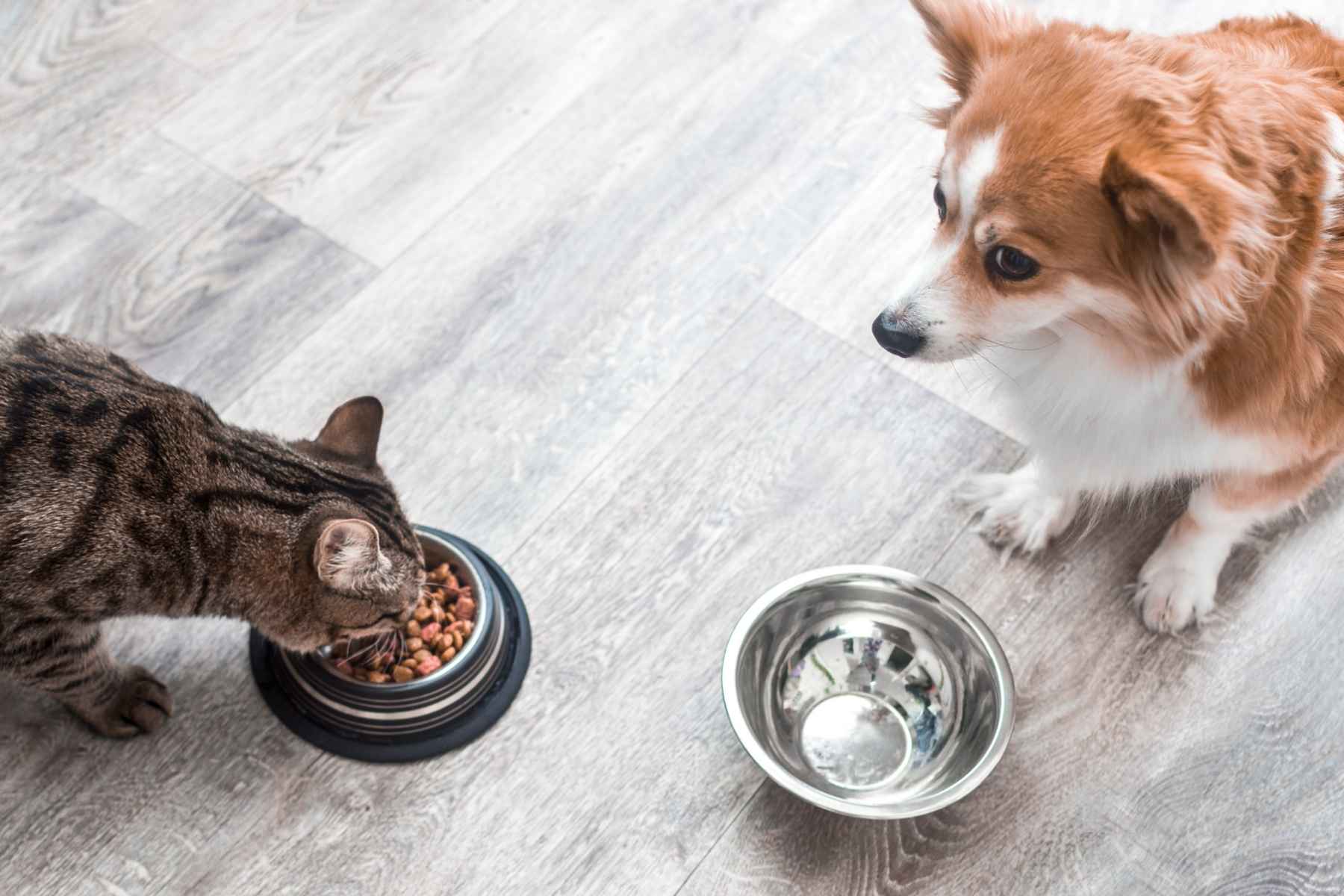
It’s not unusual for a curious cat to try their canine friend’s kibble. However, you may be wondering if it’s safe for your feline to eat it.
While cats can be fed dog food in an emergency, eating it as a regular meal poses several health risks. Since it’s for canines, dog food lacks the nutrients felines require to maintain a balanced diet. Additionally, dog kibble may cause digestive issues for cats with sensitive stomachs.
Below, this article dives into why you should avoid feeding your cat any dog food. Along the way, we’ll also explain what exactly your cat needs to maintain a healthy diet.
Why Cats Shouldn’t Eat Dog Food
Dogs and cats have very different nutritional needs and digestive systems. As a result, excessively eating dog food can cause several health-related issues in felines.
Here are some reasons why you shouldn’t feed your kitty any dog kibble:
- Malnutrition: Your cat will miss out on vital nutrients if they eat dog food instead of cat food. After all, dog kibble is tailor-made for a canine’s dietary needs, not your feline’s.
- Choking: The large size of dry dog food poses a choking hazard for your feline.
- Digestive issues: Dog food contains grain-based ingredients that cats struggle to digest. It can even cause vomiting and diarrhea if your pet has a sensitive tummy.
- Dehydration: Cats derive much of their water intake from their wet food. So if your feline eats dog kibble instead, they may become dehydrated.
- Obesity: Canine food is packed with far more carbohydrates than feline food—meaning your kitty may quickly gain weight if they consume any.
What Do Cats Need In Their Food?
Domestic cats belong to a group of animals known as hypercarnivores (also known as obligate carnivores). In other words, their natural diet comprises almost entirely of meat.
As a result, it makes sense that cats need a lot of protein and fat. Specifically, your adult feline’s diet should consist of at least 50% protein. Meanwhile, fats should make up to 30% or more.
Furthermore, you don’t want your kitty’s nutritional intake to be over 10% carbohydrates. Felines struggle to digest large amounts of this macronutrient.
This dietary balance is also why cats shouldn’t eat dog food as a regular meal. Because dogs burn more overall energy than cats, their kibble is chock full of carbs.
Eating a few pieces here and there is usually okay for your cat. However, consuming too much can lead to digestive problems and increased risk for obesity.
The Differences Between Cat and Dog Food
Dogs need a wide range of vegetable and grain-based nutrients to thrive. In contrast, a cat’s dietary needs only require meat.
So, it makes sense that cat and dog food possess very different nutritional profiles. Here are some examples:
- Carbohydrates: Dog food sometimes has twice as much (or more) carbs than cat food. This is why your feline can quickly gain weight from eating it.
- Protein: A feline’s diet should be over 50% protein. However, the balance in dog food is usually closer to 20%. Over time, that lack of protein may cause lethargy and muscle loss in your kitty.
- Size: Since dogs have bigger mouths than cats, their kibble is generally larger. Unfortunately, that size can pose a choking hazard for your kitty.
- Nutrients: Dog food includes several vitamins and minerals cats don’t necessarily need. And consuming too much may even cause your feline friend to develop digestive problems.
- Flavors: Cat food flavors are almost exclusively meat-based because felines can’t taste sweetness. Meanwhile, dog food is more likely to have a sweet vegetable-based taste.
What’s In Cat Food?
Cat food is tailor-made for the dietary needs of felines. The mix of macronutrients, amino acids, and moisture gives your kitty almost everything they need to thrive.
Here are some of the common ingredients in cat food:
- Protein from beef, fish, and poultry
- Crude fat
- Amino acids
- Water (as much as 80% or more in wet food)
- Vitamin supplements
- Corn gluten
Most name-brand cat food companies add extra vitamins and minerals to their products. That way, they ensure felines that eat it have all of their nutritional needs met.
Additionally, the water content of wet food is surprisingly important. Cats naturally derive most of their water intake from what they eat. As a result, a strictly dry food diet often leads to dehydration-related issues.
What If My Cat Eats Dog Food on Accident?
Generally speaking, your cat will be perfectly okay if they eat a little dog food.
Dog food is not nutritious for cats. However, it’s also by no means toxic. So while your cat can’t survive on it, eating a little bit of kibble won’t hurt them in most cases.
That being said, there are some risks to consider.
For example, there are rare cases where your feline may be allergic to dog food. And if that’s the case, you should call your vet immediately if your pet eats any.
According to Cornell Feline Health Center, here are some signs your cat is having an allergic reaction:
- Vomiting
- Diarrhea
- Sudden itchiness, especially around the face
- Hives
- Restlessness and incessant kicking
Additionally, large kibbles can be a choking hazard to felines—particularly kittens. So if you have a kitten, take extra care to ensure they don’t scoop up a piece.
Why Do Cats Eat Dog Food?
Even though it’s not great for their health, many cats go out of their way to eat dog kibble. However, the reasons why they do may surprise you.
You may think that if your cat eats dog food, they must just like the taste. And to be fair, that is often the case. After all, many kibble brands offer meat-based flavors that kitties love.
But as it turns out, your cat might also be subtly showing dominance over your dog—especially if they go for the food while your dog is trying to eat.
Consider moving their bowl to another room if that happens to your pup. That way, your feline friend is less likely to try and steal their kibble.
Your kitty might also start eating dog food if they’re not getting enough to eat. So if it becomes a recurring problem, double-check that your pet is getting the right proportions. Although, they may also just be trying to get extra treats!
How To Stop Your Cat From Eating Dog Food
Has your cat developed a taste for dog food? If so, there are thankfully several ways to stop them from consuming it.
Here’s how to stop your cat from eating dog food:
- Move the bowl: If your cat goes after your dog’s bowl during feeding time, try feeding your dog in another room. Closing the door may be necessary for especially insistent cats.
- Reinforcement: Stubborn cats might need some training to stop eating dog food. Tell your cat “no” and move them away when they go after the kibble. And if they listen, reward them with treats.
- Staggered feeding: Feeding your pets at different times may prevent them from bothering each other’s food. Since cats sleep mostly during midday, it can be a convenient time to feed your dog.
- Empty food out: Does your dog leave any food in their bowl? If they do, dump it out once your canine stops eating. Or put it away for later. Otherwise, your cat might snoop by for a snack.
How Long Can Cats Eat Dog Food?
In emergencies, you might not have access to name-brand cat food. And if that happens, you may wonder if dog kibble can work as a substitute.
Thankfully, cats can eat dog food temporarily when nothing else is available. Your kitty can probably go 3 or 4 meals before experiencing any harmful effects.
That being said, issues become more likely after that point. In the short term, your cat might experience trouble with diarrhea and vomiting. And over time, they may develop obesity or become lethargic from malnutrition.
If you have no choice but dog food, crumble it into pieces before feeding your cat. That makes it easier for them to chew and reduces the choking risk.
And when possible, substitute the dog kibble for unseasoned meat. Plain chicken and fish have crucial nutrients for felines that dog food often lacks—such as taurine.
Healthy Treats For Cats Who Love Dog Food
You don’t want your cat to eat dog food too much. However, that doesn’t mean you can’t still spoil your kitty!
Here are some alternatives your feline friend may enjoy if they love dog kibble:
- Broccoli: Believe it or not, many cats love to munch on broccoli. It has a satisfying crunch just like dry dog food does.
- Apples: These fruits have a crisp texture similar to kibble. They’re also packed with nutrients, such as vitamin C and potassium.
- Egg: Eggs have a rich taste that many felines adore. However, ensure you don’t add salt or seasoning while cooking them.
- Carrot: Many cats love these vegetables as much as rabbits do. Plus, they’re an excellent source of manganese and Vitamin E.
Final Thoughts
Dog food can be an emergency substitute if you can’t get cat food for some reason.
However, it doesn’t provide the nutrients that a feline needs for a healthy diet. As a result, you should generally avoid giving your cat any dog kibble.

